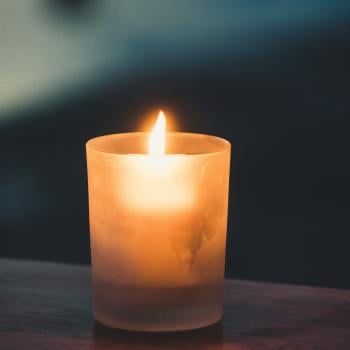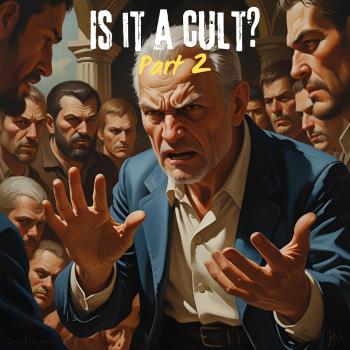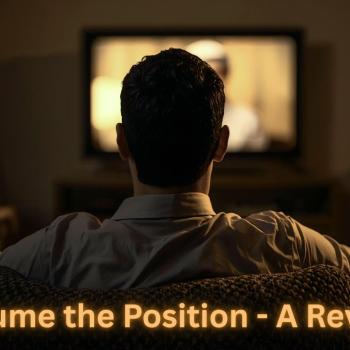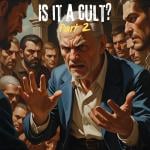
Is My Church a Cult?
Potentially unsafe groups or leaders come off very nice at first; they go for vulnerable people who are looking for answers, lonely, what you’d call ‘normal people.’ They’re very good at what they do and can get people to believe anything. You might think you’d never get taken in, but don’t bet on it. “
– Margaret Singer, Ph.D[1]
Is your church, political group, or other organization considered a cult?
When I supported and attended a Southern Baptist church, it wasn’t uncommon for us to refer to other denominations and religious organizations as cults. At that time, I didn’t have a clear understanding of how to tell whether something was cultish, cult-like, or even a real, legitimate cult. We generally saw everyone outside our group as the world and deserving of disdain, so we dismissively labeled most other groups that weren’t exactly like us.
It was only after leaving organized religion that I truly studied, watched documentaries, and listened to experts explain the harmful ways some organizations operate. The upsetting and disappointing part of this journey was realizing that most of my former groups fit quite nicely into common descriptions of how cults control, manipulate, and harm individuals, especially women and those with less power.
In other words, I was part of a cult called The Southern Baptist Convention that hurt and exploited real people. We were conditioned to ignore the warning signs. But neither of us really looked inward to see if that reflected who we truly were, because we believed we were right and that God was on our side.
This manuscript aims to provide clear definitions so that someone can honestly evaluate their organization. This kind of self-examination and honesty is essential in all areas of life to ensure we’re not fooling ourselves, as we used to say down South. According to the Cult Education Institute, there are specific warning signs to watch for when deciding if a group might be a cult. This list is by Rick Ross, an Expert Consultant and Intervention Specialist.
The comments after each point are my observations and opinions. I welcome your feedback.
Ten warning signs of a potentially unsafe group/leader (1-5)
1. Absolute authoritarianism without meaningful accountability
Pastor Greg Locke, as you may know, has a history of refusing to admit when he’s wrong, even when he makes outrageous statements that are proven false. Leaders who want to influence others and control their behavior can never admit they were wrong, or they risk losing some of their influence and power over their followers or congregation. The troubling part is that I see the same behavior in coaches, politicians, ex-pastors, and influencers, who create a facade that acts more like a shield for the leader than a transparent, truthful picture of themselves.
Cult-like behavior requires that a leader has ultimate authority and little accountability. I noticed this in the recent events involving Dr. Laura Anderson, an Exvangelical trauma therapist, who appears to have boundary issues. I responded in a comment that she appears to be managing her own accountability. These behaviors directly oppose healthy organizational practices. The leader is considered the most important, and they leverage the group’s instinct to protect the one they have trusted completely.
2. No tolerance for questions or critical inquiry
One of the biggest issues people have with organized religion is that they often can’t ask sincere questions without being quickly shut down. As a former pastor, I don’t remember doing this, but I’m sure I did, because when people questioned what I taught or how the church was viewed, it seemed like a threat to the story we were promoting.
Maybe this is a group dynamic that applies to all organizations—businesses, families, and religions alike. However, it still doesn’t seem right for an organization claiming to be approved by God to operate this way. Jesus asked many questions. Open dialogue, even though it’s more challenging, is much more effective for growth rather than just controlling the crowd. Groups should have the courage to engage with questions instead of avoiding them.
3. No meaningful financial disclosure regarding budget, expenses, such as an independently audited financial statement.
Most of the churches I served used a simple form of government where deacons or elders made most financial decisions. Occasionally, we would gather the whole congregation to give them a sense of ownership. It wasn’t necessarily that we were hiding anything, but it was much easier for a few people to make decisions rather than many. Obviously, this is practical, but the problem arises when leaders discover what they can get away with under this system.
Every business I was involved with had people who made most of the financial decisions. Still, we knew that safety programs, environmental initiatives, and our financial records could be reviewed at any time. This kept us lawful, transparent, and lowered the risk of harm from our decisions.
Beware of leaders and groups that are hyper-vigilant about resisting any accountability and review.
4. Unreasonable fear about the outside world, such as impending catastrophes, evil conspiracies, and persecutions.
Unreasonable fears were ingrained in our theology and philosophy, implying there was an enemy intent on harming us. This mythical being was associated with everyone who wasn’t exactly like us. The devil was portrayed as a roaring lion seeking to devour Christians in the arena doing God’s work. We were warned of the impending apocalypse, the second coming of Christ, and the end times, with everyday news woven into our understanding of apocalyptic literature.
This is even more evident today, where conspiracy theories and the tendency to view anyone who questions the practices or history of the church as a threat to Christians and their work are common. This leads them to retreat further into their groups, hoping it will protect them and keep them safe from the dangers posed by the “others.”
These behaviors are cult-like and widespread within the Christian Church. Even in more progressive circles, they cause Christians to fear anyone who isn’t like them and to see themselves as being persecuted.
5. There is no legitimate reason to leave. Former followers are always wrong in leaving, negative, or even evil.
After leaving the three Christian churches we pastored, we noticed that none of them reached out to us in the years following our departure. Usually, when people find out we’ve moved away from the faith and stopped attending church, they ask a few questions before making it clear they are distancing themselves from us.
Some traditions are more extreme, encouraging family members to disown those who are not believers or who have left their specific organization. This is often called shunning or staying separate from the world. People who leave their organization, believing they were right and that God was on their side, are often treated like traitors—not only to the organization but also to the family that remains inside.
I consider most of the churches I attended to be somewhat cult-like in nature. I could find an even more extreme cult, but all of them had tendencies that I couldn’t see when I was inside. The best way to make an honest assessment of the organization we’re involved with is to step back and look at it from the outside. Once we gain a proper perspective, we can make a meaningful evaluation of whether we should return. There are too many distractions, busy work, and spiritual bypassing within organizations to assess them correctly from the inside.
In the next issue, I will cover the remaining five characteristics. I have been accused of criticizing religion, but I honestly see it as a thorough evaluation based on facts, observations, studies, and examining the trauma-related damage that organized religion tends to cause even among its most devoted followers.
Be where you are, Be who you are, Be at Peace. Karl Forehand
[1] https://www.amazon.com/Cults-Midst-Margaret-Thaler-Singer/dp/0787902667
Learn to be Where You Are (Presence)
Learn to be Who You Are (Authenticity)
Finding Regulating and Somatic Healing
Are you genuinely committed to deconstruction and seeking more profound answers?
If that’s the case, this book was created for you. As a former pastor, I made the mistake of deconstructing a bit and then trying to start something new, as I was trained to do. The problem with that approach is that I wasn’t ready to begin something new.

I hadn’t delved deeply enough or asked enough questions. The first stage of deconstruction typically includes assessing our beliefs regarding hell and the afterlife, supporting queer individuals and women in their fight for equality, and achieving a better understanding of racism and privilege.
Many people in deconstruction communities expend significant effort criticizing Evangelicals and attempting to gain a following. While I believe they deserve intense criticism, this strategy fails to effectively tackle the problem because they generally don’t listen to us!
Our tendency to punish our former organizations sometimes overlooks the challenging process of healing and growth. It is the same trap we fell into in our former associations.

Campfires occupy a special spot in the mosaic of history. They act as communal hubs across different cultures and faiths. The campfire’s circular design fosters equal participation within the collective group. The flames at the center draw our focus and encourage face-to-face interactions as we exchange experiences, wisdom, and insights about the world beyond. It is where legendary myths and tales are born.
Order Now – Study Questions in each chapter!
This book is named Campfires in the Desert as it stems from nearly 400 discussions we held with individuals on our podcast, The Desert Sanctuary, and our aspiration to improve.
Available now!
Thanks for considering us. Autographed copies are $20
Karl Forehand Campfires in the Desert – A Soft Book Release. Karl Forehand is a former pastor, podcaster, and award-winning author. His books include Out into the Desert, Leaning Forward, Apparent Faith: What Fatherhood Taught Me About the Father’s Heart, The Tea Shop, and Being: A Journey Toward Presence and Authenticity. He is the creator of The Desert Sanctuary podcast and community. He has been married to his wife Laura for 35 years and has one dog named Winston. His three children are grown and are beginning to multiply! You can read more about the author here.

















